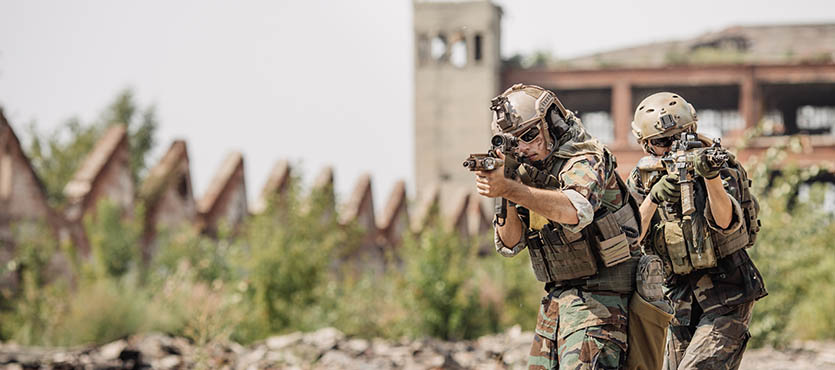Over 20,000 private military contractors are stationed in Syria, Iraq, and other U.S. Central Command (USCENTCOM) areas of responsibility (AORs).
Contractor employment in Iraq dropped off to literally nothing in the fiscal year 2014. Since then, use has increased and is now close to Iraq War levels. Overall CENTCOM contractor employment peaked in 2013 and has declined almost every year since then.
Normally, the DoD does not release specific contractor employment figures so it does not give troop deployment information to enemies.
What Contractors Do
The conflicts in Syria and Iraq are winding down, or at least in lulls. But contractors continue playing important roles in these two war-torn countries.
Between 1920 and 2005, Iraq alternated between periods of immense growth and immense stability. But since a new multiparty government was sworn in in 2005, Iraq has been mostly stable and growing.
With the new government in place, and a 2007 troop surge stemming violence, the U.S agreed to withdraw from Iraqi cities by mid-2009 and get completely out of Dodge by the end of 2011.
But Iraq was not out of the woods yet. 2011 Arab Spring protests, polarization due to the ongoing Syrian Civil War, and increased ISIL activity pushed Iraq to the breaking point. But the government held firm. By 2017, government forces had defeated ISIL and stabilized the country.
The country has dealt with civil unrest since 2019, but this unrest pales in comparison to what the Iraqis went through earlier this millennium.
Meanwhile, to the west, Syrian strongman Bashar Assad has claimed victory in the long-term civil war. Indeed, his forces and their Russian allies control most of the country. But the Turks in the north and the rebels in the east are not licked yet.
Furthermore, when ISIL forces were pushed out of Iraq, they found a new home in Syria. Then, in 2020, the double whammy of the coronavirus crisis and an economic crisis put the country on the rose once again. It remains to be seen whether Assad can pull it together.
Maintenance/Logistics
The public perception of a private military contractor is a gun-toting mercenary who shoots first and asks questions later. However, the vast majority of contractors work in non-combat areas, including logistics and maintenance.
Sometimes, security and logistics overlap. Armed contractors often escort supply convoys through dangerous areas. But the biggest contractor role is in logistical planning. Someone has to figure out what vehicles to use, what should be loaded on them, what route they should take, and so on. In most cases, a private military contractor handles these chores.
Maintenance used to involve spare parts and oil changes. Those days are long gone. Advanced drones, missiles, helicopters, and other weapons require advanced maintenance. That is especially true in harsh Southwest Asia environments. Frequently, private contractors worked for the companies that designed and built these systems. So, these contractors are uniquely qualified to not only maintain them but pass on what they know.
Base Support
Once again, base support is usually a mixture of security and construction contractors. Both are vital in Southwest Asia and elsewhere.
Many regular servicemembers almost consider guard duty a form of punishment. But private military contractors usually feel much differently. They know that if they do their jobs, they deter evildoers, and everyone can go home sooner. Additionally, many armed contractors are former law enforcement officers, so they know how to ask questions first and shoot only if they have to.
Most bases in Southwest Asia are almost constantly under construction. Tent cities quickly evolve into real cities with mundane needs like plumbing, waste disposal, and overall sanitation. For efficiency’s sake, the DoD would much rather hire private contractors for these chores than rely on the Seabees and other combat engineers.
Translators
Contractors are a special breed, and translators are an even more special breed. A good translator does not just translate English to Arabic. A good translator overcomes the cultural barrier, in addition to the language barrier, and also helps trust develop between Americans and locals. That trust could literally be the difference between life and death. People who trust translators are more likely to tell them about enemy activity.
Injury Compensation Available
These diverse areas all have at least one thing in common. The potential for a trauma injury or occupational disease is equally high in all of them. These injuries are especially challenging since, in many cases, the closest competent medical facility is not very close.
A fall is a good example of a trauma injury. Slip-and-falls usually cause permanent injuries, and a fall from as little as four stories above ground is usually fatal. Occupational diseases include hearing loss, repetitive stress disorders, toxic exposure illnesses, and other conditions that develop over the course of more than one work shift. The 1941 Defense Base Act compensates victims in both categories.
The DBA replaces lost wages and pays reasonably necessary medical bills. Typically, these no-fault benefits pay two-thirds of victims’ lost wages until their doctors clear them to return to work full-time. Most DBA victims may choose their own doctors.
The medical bills in a catastrophic injury case could be over $100,000. The medical bills in a serious occupational disease claim, like toxic exposure cancer, could be even higher. The DBA compensates victims for both past and future medical bills. Frequently, insurance adjusters and DBA lawyers greatly disagree as to what is “reasonably necessary.” So, victims without lawyers could be financially responsible for many prior and future medical bills.
For more information about specific DBA benefits, contact Barnett, Lerner, Karsen, Frankel & Castro, P.A.

